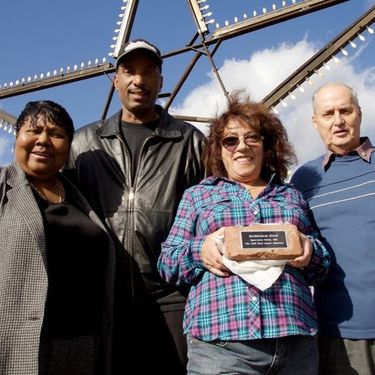
Sahar Khoshnood
Sessions auxquelles Sahar Khoshnood participe
Lundi 6 Juin, 2016
Sessions auxquelles Sahar Khoshnood assiste
Vendredi 3 Juin, 2016
This forum will explore the current directions of critical heritage studies and what makes ACHS distinctive. Panel members will discuss what the term critical means to them, and what directions they would like to see develop in the future. To help develop an open dialogue, the session will also give considerable time to contributions from the audience.
Welcome addresses and cocktail, followed by the Concordia Signature Event "The Garden of the Grey Nuns". As the opening ceremony and cocktail take place in the former Grey Nuns' Motherhouse, recycled into campus residence and reading rooms by Concordia University, delegates will also have the possibility to discover the video Three Grey Nuns (3 minutes, by Ron Rudin and Phil Lichti. Three Grey Nuns recount their memories of communal life in the Grey Nun’s Motherhouse. Built...
Working with archival documents and the current-day morphology of the Grey Nuns' site, Dr Cynthia Hammond, Dr Shauna Janssen, in collaboration with Dr Jill Didur, will curate a series of installations and performances that speak directly to the rich heritage of a specific urban landscape: the gardens of the Grey Nuns' Motherhouse, now part of the Concordia University downtown campus. Visitors will have the opportunity to explore the lost working gardens of the Grey Nuns. As with other such...
Samedi 4 Juin, 2016
What if we changed our views on heritage? And if heritage has already changed? While, on the global scene, states maintain their leading role in the mobilization of social and territorial histories, on the local scale, regions, neighbourhoods and parishes have changed. Citizens and communities too: they latch on to heritage to express an unprecedented range of belongings that no law seems to be able to take measures to contain, often to the discontent of...
Much is being made of the perceived breakdown of the nation-state, which was historically configured as a “container” of heritage formations, adopting and perusing local traditions where possible but oppressing them where deemed unsuitable. Migration is seen as eroding the rigid boundaries of this configuration, potentially liberating identities and heritages in the process. This session addresses the relationship between critical heritage and redefinitions of self, other, community and place...
Heritage practices often lead to social exclusion. As an "Authorized Heritage Discourse" (AHD) (Smith 2006) may define what is considered to be heritage, a certain set of social values can come to exclude other values. By formulating heritage policies which reproduce the existing AHD government may further such exclusion. Every now and then AHDs are challenged, leading to what political scientists like Ross (2007; 2009) call "cultural contestations" between groups. These are surrounded ...
Many people are actively using working class heritage as a resource to reflect on the past and the present, and there is a growing tendency for the heritage of working class people to be interpreted and presented to the public in museums and heritage sites—see for example the Worklab network of museums. Working class communities and organizations also play active roles in creating a memory of their own past, and mobilizing this to sustain political action in the present. Drawing on scho...
In recent decades, the growth of the World Heritage industry has necessitated the reconsideration of scale. Formerly dominated by nation-states, some influential international organizations such as UNESCO and its advisory bodies (ICOMOS and IUCN) are now taking a strong role in decision-making through policy-making and implementation. Despite the power of the transnational organization and its relation with states parties, there is a growth of regionalism and “localism” in the heritage indust...
This festive event will offer delegates a taste of one of the iconic dishes of Montreal, the smoked meat sandwich, imported by Jewish immigration from Eastern Europe in the early 20th century. In particular, the tasting will allow a discovery of the products of the renowned international institution Schwartz's, the Hebrew Delicatessen for which Montrealers and tourists alike are willing to wait in long line-ups. During the tasting, “Chez Schwartz,” a documentary produced by Garry B...
Most of what we experience as heritage emerges into conscious recognition through a complex mixture of political and ideological filters, including nationalism. In these processes, through a variety of devices (museums, scholarly research, consumer reproduction, etc.), dualistic classifications articulate a powerful hierarchy of value and significance. In particular, the tangible-intangible pair, given legitimacy by such international bodies as UNESCO, reproduces a selective ordering of cul...
Dimanche 5 Juin, 2016
Canal: Walking the Post-Industrial Lachine Canal (COHDS, 2013 - bilingual) is an audio-walk and booklet that takes listeners from the Atwater Market to the Saint Gabriel Lock, exploring the post-industrial transformation of a once heavily industrialized area. The Lachine Canal area has undergone dramatic changes, as mills and factories were closed and then demolished or converted into high-end condominiums. The adjoining working-class neighbourhoods ...
With his expression "ceci tuera cela," Hugo established almost two centuries ago a strong link between words and stones as transmission vehicles of human memory. We heritage experts would be inclined to consider stones as more reliable than words, what semiology seems to confirm: stones are clues, and clues are, according to Roland Barthes, tangible proofs of “what has been.” But the inspector Columbo has often shown how we can play with these clues, and Umberto Eco would easily forgive us th...
"What does heritage change?" is a multifaceted question to which the answer(s) are in primary respects related to real-life negotiations among different groups of citizens, cultures, races, ethnic groups, sexual identities, and social classes about received, official and/or widely accepted or accomodated intangible attributes, cultural traditions, historic monuments, buildings, and other transmitted or revived historical legacies. Heritage designated by and for whom, for what motivations, an...
Lundi 6 Juin, 2016
Cities are growingly being faced by social, economic, cultural and environmental challenges imposing health and social risks. Rapid urbanization, population growth, climate change are only some of the major global challenges that a 21st century city needs to respond to. The current challenging global environment has led to the development of new approaches to the concept of "sustainable city" a city that caters for current and future generation. For instance, the idea of smart city (a city th...
To celebrate our film series dedicated to heritage, sponsored by the Department of American Studies at the University of Maryland and the United States Chapter of the Association of Critical Heritage Studies, this event will spotlight the iconic Sugar Shack, which is rooted from Quebec to New-England and which is both the place of maple syrup production and of friendly gatherings during the maple syrup season. In a festive atmosphere, delegates will be invited to taste one of the essential of...
Directed by William Shewbridge and Michelle Stefano USA; 35 mins Presented by Michelle Stefano ___ After 125 years of operation, the Sparrows Point Steel Mill (Baltimore, Maryland) finally closed its doors in 2012. The film, “Mill Stories”, examines the importance of the mill from the perspectives of former workers and community members while connecting their story to the larger narrative of industrial boom and bust. The film seeks to amplify the voices of forme...
Mardi 7 Juin, 2016
(en français) Le centre-ville a été au cœur de nombreuses luttes depuis les années 1970. Le parcours proposé par Martin Drouin, historien, professeur au département d’études urbaines et touristiques de l’Université du Québec à Montréal, présentera quelques combats qui ont marqué la scène patrimoniale et transformé le paysage urbain montréalais. _ Downtown Montreal has been at the centre of numerous struggles since the 1970’s. The itinerary proposed by Martin Drouin, historia...
In exploring the broader question “What does heritage change?” this session presents work that is extending heritage policies and practices beyond elite cultural narratives. Using diverse disciplinary perspectives and drawing from case studies around the world, the presenters explore contexts in which stakeholders’ perspectives and choices have been catalysts for change, democratized knowledge, or exposed gaps in contemporary heritage practices. The case studies reveal complex and often conte...
As the interface between past and present, heritage is deeply involved in articulations of personal and group identity, working to unite and harmonize group relations, and, simultaneously causing frictions, fractions, and violence. Critical heritage theory reveals that values and approaches to heritage are articulated both within and across regions (such as Asia, or Europe). A vital, and as yet unanswered, question centres on the degree to which heritage in Asia fundamentally differs from ...
While historical churches are being abandoned all over the Christian West, more and more places are growing the opposite way: pilgrimage sites are being enlarged and enhanced, whole urban districts are being developed with churches and temples boasting diverse, and often unorthodox, religious practices. Epistemologically linked to heritage, the sacred now seems to follow a path of its own, staging itself in new settings where the “religious heritage” refers mostly to common practices, however...
Canada is often pictured as vast territory of wilderness and wide-open spaces. Yet most of Canadian life plays out in interior spaces. These spaces dominate our daily life, frame memories, and can hold the traces of our histories. Interiors are also particularly challenging spaces for traditional heritage policy, as they are notoriously fluid, changing, and ever evolving to meet new needs and desires. Compounding the problem, the ‘designers’ of interiors—interior decorators and interior de...









